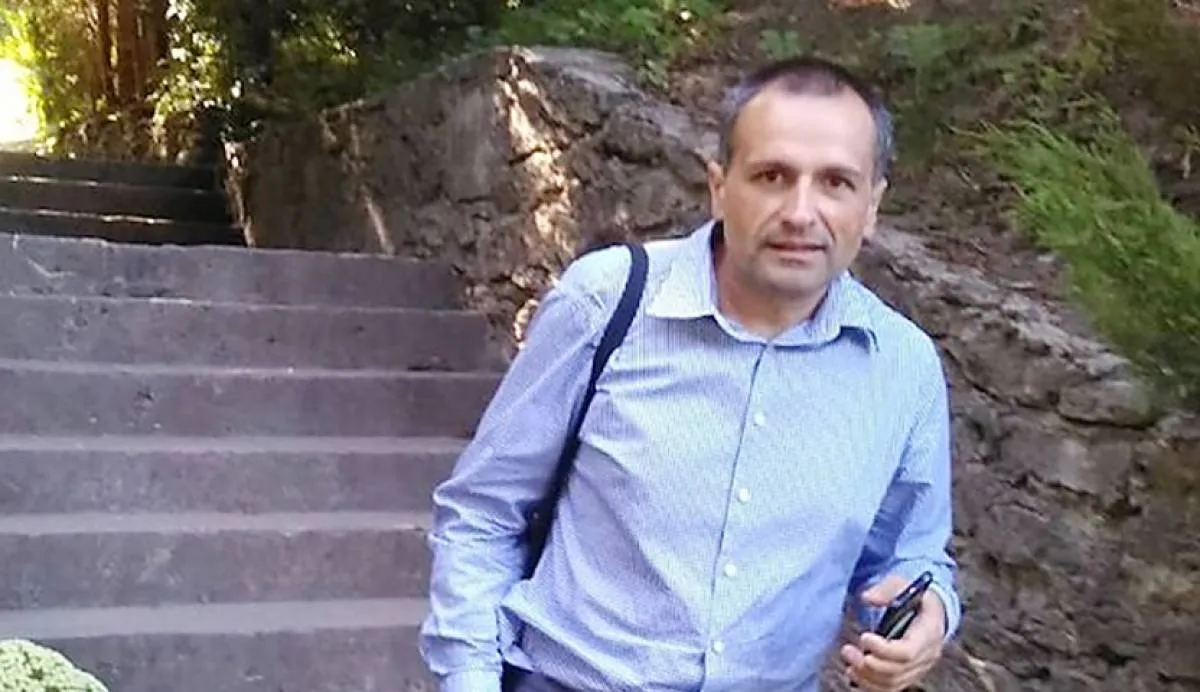
Dmytro Zelinsky, a 45-year-old Seventh-day Adventist, is serving 3 years in prison for refusing to engage in military mobilization as it conflicts with the tenets of his faith. On June 5, 2023, Judge Tetyana Klim of the Kremenets District Court in the Ternopil region had acquitted him on the basis of Article 35 of the Ukrainian Constitution, which provides, “If the performance of military duty contradicts a citizen's religious beliefs, the performance of this duty shall be replaced by alternative (non-military) service.” On August 28, 2023, on an appeal filed by prosecutor Roman Harmatiuk, the Ternopil Court of Appeals overturned the June acquittal. Dmytro Zelinsky appealed to the Supreme Court, which upheld the sentence on June 13, 2024. Dmytro Zelinsky then appealed to the Constitutional Court, which upheld his appeal and on September 24, 2024, began the consideration of his case.
The law on alternative (non-military) service will be examined by the ukrainian Constitutional Court
HRWF (19.10.2024) - On 24 September 2024, the Constitutional Court of Ukraine opened proceedings in the case regarding the constitutionality of Article 1 of the Law of Ukraine "On Alternative (Non-Military) Service". This decision was made after meetings of the panels of judges of the Second Senate of the Constitutional Court, where constitutional complaints were considered.
The subject of the right to a constitutional complaint was a citizen of Ukraine, Dmytro Zelinsky, an Adventist who appealed to the Court with a request to verify the compliance of part one of Article 1 of the Law "On Alternative Service" with part four of Article 35 of the Constitution of Ukraine.
The subject of the right to a constitutional complaint, Dmytro Zelinsky, appealed to the Constitutional Court of Ukraine with a request to check the compliance of part one of Article 1 of the Law of Ukraine "On Alternative (Non-Military) Service" of 12 December 1991, No. 1975-XII, according to which "Alternative service is a service that is introduced instead of fixed-term military service and is aimed at fulfillment of duty to society."

Dmytro Zelinsky. Photo: © Iryna Zhukova [CC BY-NC-ND 4.0]
According to the applicant, since the contested order stipulates the replacement of alternative (non-military) service only with fixed-term military service, which does not exist in Ukraine today, this completely makes it impossible to exercise the constitutional right defined in part four of Article 35 of the Constitution of Ukraine, according to which "If the performance of military duty contradicts the religious beliefs of a citizen, the fulfillment of this duty must be replaced by alternative (non-military) service".
In particular, Zelinsky challenges the provision according to which alternative service is a substitute for fixed-term military service only.
The applicant points out that there is currently no fixed-term military service in Ukraine, which, in his opinion, makes it impossible to exercise the right to alternative service, which is provided for by the Constitution for those whose religious beliefs contradict the performance of military duty.
Zelinsky appealed to the court after the verdict was passed by the Ternopil Court of Appeal on 29 August 2023, which overturned the acquittal of the court of first instance and found him guilty of committing a criminal offense under Art. 336 of the Criminal Code of Ukraine.
The court sentenced him to three years in prison. Dmytro Zelinsky, referring to his religious beliefs, demanded the exercise of the right to alternative service in accordance with part four of Art. 35 of the Constitution of Ukraine, which provides for the possibility of fulfilling one's duty to the state of Ukraine without weapons.
Normative framework
The Constitution of Ukraine (Article 35) enshrines the right to freedom of religion or belief.
By granting freedom to profess any religion or not to profess any, to freely perform religious and ritual ceremonies individually or collectively, to conduct religious activities, the Constitution states that no one can be relieved of his duties to the state or refuse to obey laws on the grounds of religious beliefs. At the same time, if the fulfillment of military duty contradicts the religious beliefs of a citizen, the fulfillment of this duty must be replaced by alternative (non-military) service.
According to the Law of Ukraine On Military Duty and Military Service, military duty includes both measures to prepare citizens for military service and military service related to the defense of Ukraine, its independence and territorial integrity. By definition, military duty applies not only to peacetime but also to wartime. Therefore, if we read the Constitution and the definition of military duty provided by a special law, it is seen that the right to replace military duty with alternative (non-military) service should have been provided for both in peacetime and in wartime.
However, the special law of Ukraine "On Alternative (Non-Military) Service" provides for the possibility of replacing only fixed-term military service in peacetime with alternative (non-military) service.
Fixed-term military service was abolished with the outbreak of hostilities on the territory of Ukraine, and general mobilization was introduced by presidential decree in 2022. The law does not provide for the possibility and procedure for replacing military service with alternative (non-military) service during military conscription (mobilization).
Therefore, a contradictory situation has arisen in the issue of alternative (non-military) service in Ukraine, both in terms of normative regulation and in terms of law enforcement.
This gave rise to ambiguous law enforcement practice, as a result of which both acquittals and convictions were handed down against persons whose religion prohibits taking up arms and who refused to join the ranks of the Armed Forces of Ukraine for religious beliefs. The vast majority of them requested the replacement of conscription with alternative service, but this was not possible.
There was an attempt at the legislative level to find a solution.
Draft law on alternative (non-military service) in wartime
On 24 July 2024, the Verkhovna Rada of Ukraine registered Draft Law No. 11439 "On Amendments to Article 23 of the Law of Ukraine "On Training and Mobilization" to ensure the constitutional right of citizens to alternative (non-military) service.
A legislative initiative was taken by Georgiy Mazurashu, a member of the Verkhovna Rada. Bill No. 11439 is aimed at ensuring the constitutional right to alternative (non-military) service of citizens who due to their religious beliefs cannot take up arms.
According to this draft law, it is proposed to amend Article 23 of the Law of Ukraine "On Mobilization Preparation and Mobilization". The main purpose of the changes is to expand the range of persons entitled to deferment from military service.
The draft law provides for the inclusion into the list of persons who are not subject to conscription for military service during mobilization, for a special period:
- clergy belonging to churches and religious organizations (associations) that are members of the All-Ukrainian Council of Churches and Religious Organizations, and whose activities are not prohibited in Ukraine;
- citizens of Ukraine who confirm in writing that the fulfillment of military duty contradicts their religious beliefs (these citizens must replace the fulfillment of this duty by alternative non-military service).
However, this draft law does not provide for amendments to the Law "On Alternative (Non-Military) Service", which seems necessary to achieve its goal.
Now the draft law is in the Verkhovna Rada of Ukraine.
Zelinsky’s complaint to the Constitutional Court and Draft Law 11439 are in no way related to each other but both of them try to give a solid and comprehensive legal framework to the issue of conscientious objection to military service.
Source: HRWF





